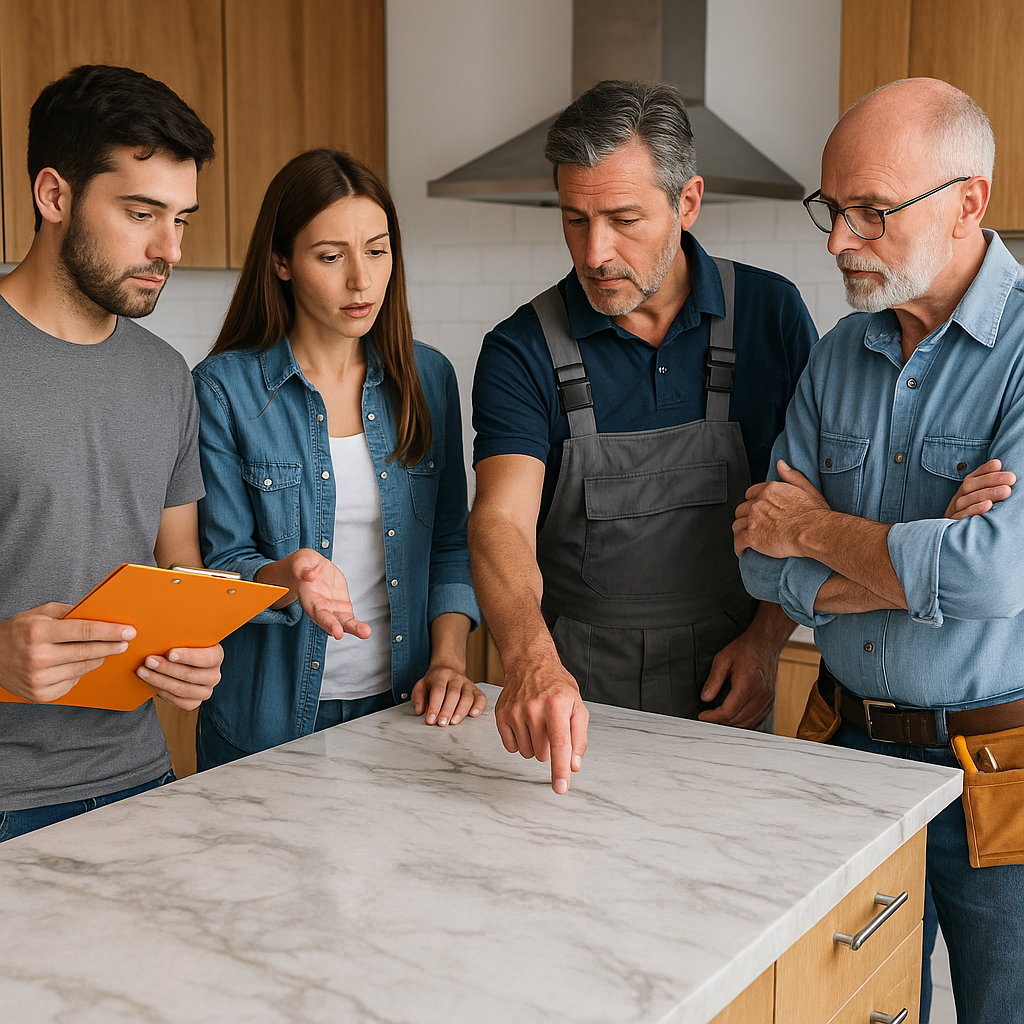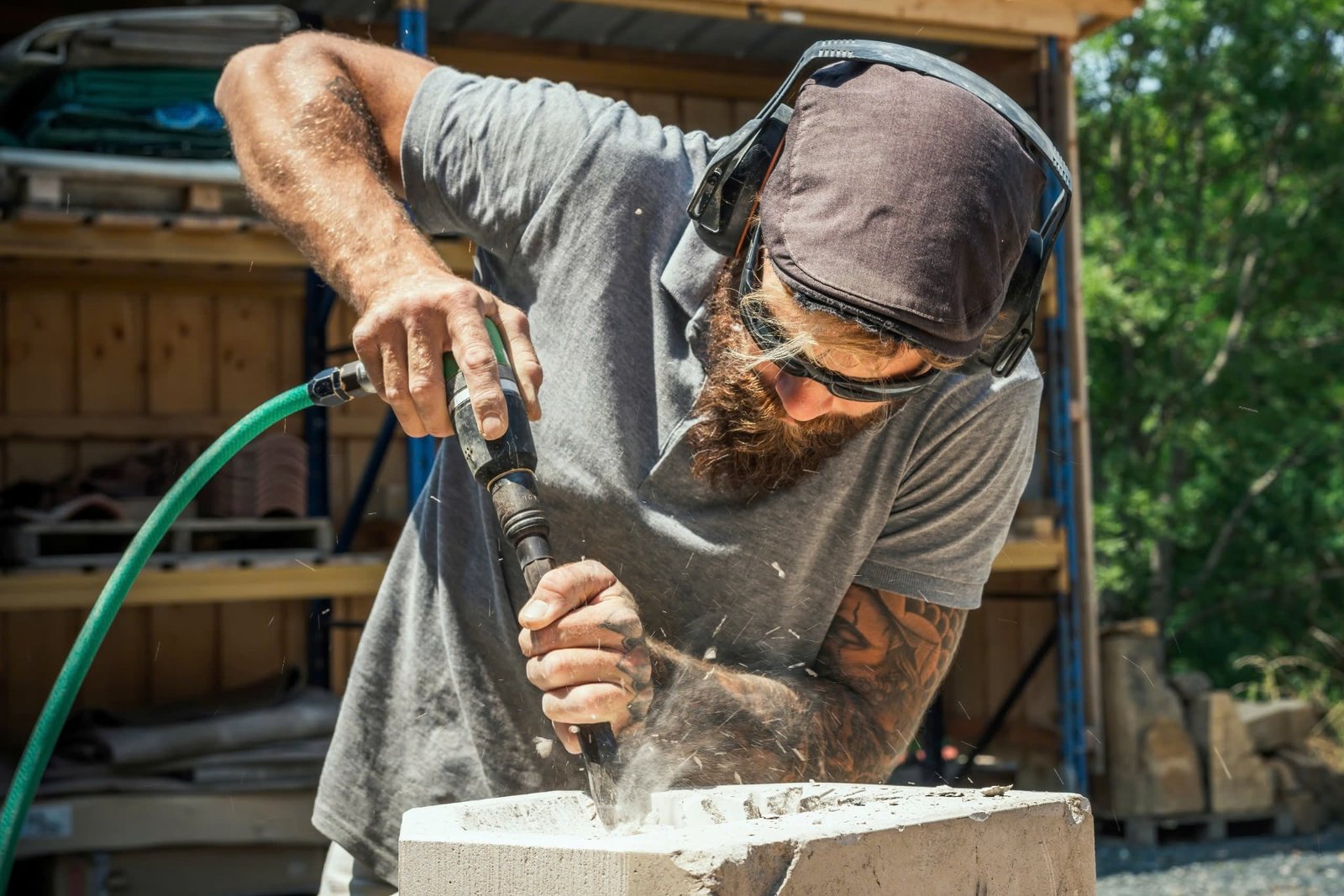
Countertop installation is one of the most rewarding home upgrades, especially for DIY enthusiasts looking to transform their kitchen on a budget
Countertop installation is one of the most rewarding home upgrades, especially for DIY enthusiasts looking to transform their kitchen on a budget. But while DIY projects offer flexibility and cost savings, they also come with risks—particularly when working with materials like granite, quartz, or butcher block. If your DIY countertop installation goes off track, knowing who to contact and how to respond can save you time, money, and stress.
This guide explores the most common issues that occur during DIY kitchen countertop installation and explains who you can call on for help when something goes wrong—whether it’s a botched cut, uneven surface, or a cracked granite slab.

Why DIY Countertop Installation Can Be Tricky
DIY countertop installation projects seem straightforward at first. You measure, cut, set, and seal—simple, right? In reality, however, issues like poor leveling, incorrect cutouts, cracked slabs, or adhesive problems are common, especially for first-timers.
Even with good tools and preparation, problems may still arise due to:
- Lack of experience with stone or heavy surfaces
- Misaligned seams or unsupported overhangs
- Inaccurate cuts for sinks or cooktops
- Improper sealing or adhesive application
That’s why it’s critical to prepare thoroughly. Start here:
👉 What You Need to Know About Countertop Installation: A Complete Guide
Most Common DIY Countertop Problems
Before figuring out who can help, identify what went wrong. Some of the most frequent DIY issues include:
- Cracked granite or quartz slabs
Caused by mishandling or improper support during granite countertop installation or quartz countertop installation. - Poor seam alignment
Occurs when sections of countertop aren’t level or are cut inaccurately. - Warping or lifting
Happens when adhesives are used improperly or cabinets are not leveled. - Incorrect sink or appliance cutouts
Common for first-time DIYers who lack templating experience. - Unsealed surfaces
Leads to staining or bacterial growth, especially in porous materials like granite or butcher block.
Who Can Help When DIY Countertop Installation Goes Wrong?
1. Countertop Repair Specialists
These professionals are trained to fix issues like cracks, chips, or uneven seams without needing a full countertop replacement. They can:
- Fill cracks with epoxy or resin
- Rebond separated seams
- Polish out surface imperfections
- Reseal natural stone surfaces
Hiring a repair technician is often more affordable and faster than replacing the entire counter.
2. Stone Fabricators
If your slab is broken, miscut, or needs additional shaping, a stone fabricator is your best ally. They can:
- Recut countertops to fix sizing errors
- Create sink or faucet cutouts with professional-grade tools
- Polish and finish edges
- Replace damaged sections of quartz or granite
These experts are particularly useful if you’ve already purchased raw slabs and need finishing support.
3. General Contractors or Handymen
If the issue extends beyond the countertop—such as unlevel cabinets, plumbing misalignment, or structural problems—a general contractor or handyman can step in to:
- Level cabinets
- Secure countertop bases
- Adjust plumbing and appliance connections
- Reinstall backsplashes or supports
This is a great option if you started with a partial DIY and now need professional completion.
4. Professional Countertop Installation Services
In some cases, the best fix is to hire a full-service installer to correct your project. Professionals offer:
- Complete kitchen countertop fitting
- Secure placement of heavy materials
- Seam sealing and finishing
- Warranty-backed installation
Search for countertop installation near me and review companies that specialize in both installation and repair.
How to Prevent DIY Mistakes Before They Happen
Prevention is better than repair. Here are a few tips that could help you avoid problems during a DIY countertop installation:
- Use proper templates for sinks and cooktops
- Always dry-fit before final installation
- Double-check that cabinets are perfectly level
- Use stone-specific adhesives and sealers
- Leave expansion gaps to accommodate movement
Timing also plays a role in success. Plan your project strategically. Learn more:
👉 When Is the Best Time to Start a DIY Countertop Installation Project?
Estimated Costs of Repair vs. Replacement
| Service Type | Estimated Cost |
|---|---|
| Crack repair (granite/quartz) | $150–$500 |
| Seam re-bonding and polishing | $200–$600 |
| Countertop resurfacing | $250–$800 |
| Full countertop replacement | $1,500–$5,000+ |
Getting help early can prevent minor issues from turning into full-blown replacements.
How to Choose the Right Professional for Help
When searching for assistance:
- Look for experience with your material (especially granite or quartz)
- Read online reviews and request before/after photos
- Ask about warranties on repair or reinstallation work
- Get at least two quotes before deciding
You can often find repair specialists through kitchen showrooms, stone yards, or platforms like Angi and Thumbtack.
When It’s Time to Give Up on DIY
While most problems are fixable, sometimes it’s better to turn the project over to professionals—especially if:
- Structural cracks run deep into the material
- Your cabinets or substructure are not level or damaged
- Multiple seams or cutouts are misaligned
- The material is too heavy to handle safely
At that point, hiring help ensures your project meets safety standards and lasts for years to come.
Final Thoughts
DIY countertop installation can be rewarding, but when problems arise, it’s crucial to know where to turn. Whether it’s a surface repair, seam adjustment, or full countertop replacement, skilled professionals can help salvage your project—and your peace of mind.
Don’t let a few errors derail your renovation. With the right help, you can still achieve a polished, functional, and beautiful kitchen space. And next time? You’ll be even more prepared.

